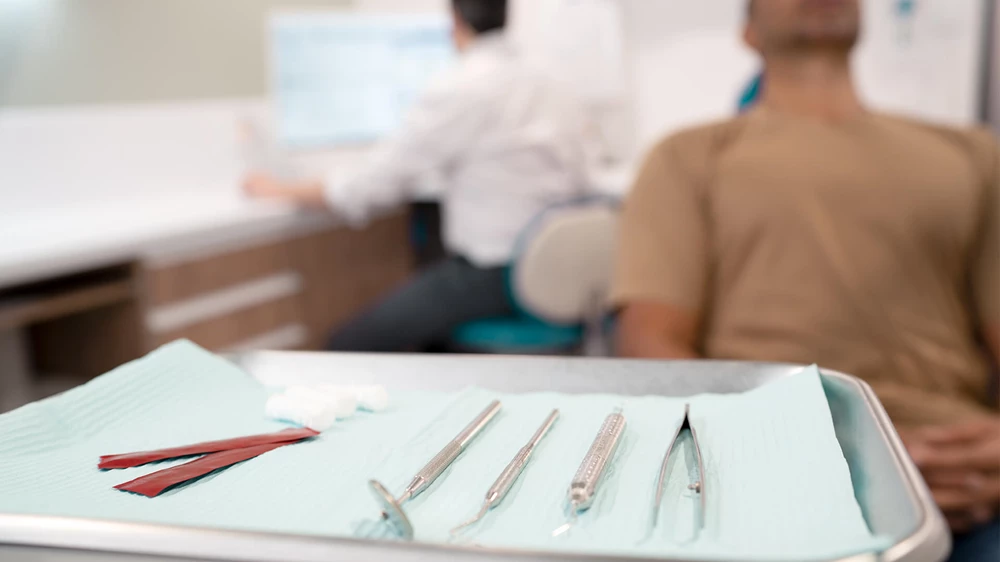- About us
- Dental Problems
Teeth & Gums
Cosmetic Improvement
Common Issues
- Treatments
Dental Services
Cosmetic Dental Services
Dental Specialists
- Before & After
- Patient Safety
- Contact
- Blog
-
Clinic Timing
12:00pm to 9:00pm
- About us
- Dental Problems
Teeth & Gums
Cosmetic Improvement
Common Issues
- Treatments
Dental Services
Cosmetic Dental Services
Dental Specialists
- Before & After
- Patient Safety
- Contact
- Blog
Treatments
Oral & Maxillofacial Surgeon
An oral and maxillofacial surgeon is a specialized surgeon who focuses on treating conditions in the mouth, face, and jaw region. These highly trained specialists possess advanced expertise in performing various surgical procedures, including removal of teeth. Patients who require complex dental treatments or surgery are typically referred to an oral and maxillofacial surgeon, who ensures their comfort before, during, and after the procedure.
Oral and maxillofacial surgeons undergo a minimum of five years of specialized training to become experts in performing surgery on the face, mouth, and jaw. They possess specialized training in sedation techniques and working under general anesthesia to help patients feel as comfortable as possible during surgery, thus providing them with the highest quality care.
Education
Oral surgery has a long history, with advancements in technology over the years improving its speed, effectiveness, and comfort for patients
Our specialized oral surgery practice in Lahore offers a range of services to cater to your oral and maxillofacial surgery needs. Our experienced oral and maxillofacial surgeon, Dr. Ali Farooq, has 17 years of expertise in the field and ensures patients feel comfortable and at ease during their surgical procedures.
Some of the common procedures that oral & maxillofacial surgeons perform are:
- Wisdom tooth removal
- Surgical dental implant placement
- Apicectomy, which is an operation where the end of the root tip is removed
- Salivary gland problems
- TMJ disorders

Need To Know
Appointments
- Usually 1-2 appointments
- The first consultation visit is where your oral & Maxillofacial surgeon will go over your surgery, including the cost
- The next visit will be for the surgery
- Further appointments may be needed if you have any problems after the surgery
How long it takes
- The consultation will usually take around 30 to 45 minutes.
- Treatment visits will usually be at least 1 to 2 hours, however they will vary depending on the scale of the treatment
Before your appointment
For the consultation you will not need any special preparation, but you should have knowledge to hand about your dental and medical history.
Before surgery with local anesthesia you should:
- Take pre-operative medication at the time if prescribed.
- Have someone accompany you and drive you to your appointment.
- Wear something warm and comfortable with loose sleeves.
After your appointment
If you have had any wisdom teeth extraction procedure done:
- Use ice packs as much as possible to prevent swelling during the first 48 hours
- Don’t rinse your mouth out on the day of the surgery as it will cause bleeding
- Don’t smoke for as long as possible after surgery
- Be careful with hot food and drinks
- Eat a soft food diet
- On the day after the removal, rinse three times a day after meals with warm, salty water
- Use prescribed mouthwash from the following day, morning and night
You may be asked about
- Your dental history and medical history
- Your oral health care routine at home
Quick tip
- It’s normal to experience some swelling and discomfort following oral surgery. We usually recommend taking a couple of days off work to rest. It’s also normal to experience some bleeding or slight oozing from the wounds. Your oral surgeon will give you gauze to help control the bleeding. You will need to bite down with gentle pressure for around 20 to 30 minutes if this happens.
FAQs
01. How much does oral surgery cost?
While good oral hygiene and regular dental visits may help prevent certain oral health issues, oral surgery may still be necessary in some cases. Factors such as the degree of pain caused by wisdom teeth and their eruption patterns can make wisdom tooth removal difficult to prevent, even if overall oral health is good.
02. Can oral surgery be prevented?
In some cases, oral surgery can be prevented with good oral health and hygiene, as well as regular dentist visits. However sometimes you will need oral surgery even if your oral health is good and you regularly visit the dentist. Wisdom tooth removal surgery is difficult to prevent as it depends on the pain your wisdom teeth cause and the way they have erupted in the mouth.
03. Is oral surgery painful?
Oral surgeons prioritize ensuring patients are comfortable during treatment and surgery. During the consultation, patients can discuss any concerns they have about the procedure with their surgeon, who will recommend the best options to help them feel at ease during the surgery. Many oral surgeries can be performed under sedation, which can effectively manage pain and help patients feel more relaxed during the procedure. Following the surgery, patients may experience some pain or discomfort, but this can usually be managed with pain medication and typically subsides within a few days.
04. When do you need to see an oral surgeon?
Oral surgery, which includes complex dental treatments like implant placement, wisdom tooth removal, and TMJ treatment, typically involves sedation to ensure patient comfort. Following the procedure, patients may require rest and recovery time, as it may take some time for the sedation to wear off. Swelling, pain, and discomfort may also be experienced, but these can be managed with ice packs and pain medication. Recovery time usually takes a few days, during which patients may need to modify their diet and dental care routine. It is important to have someone available to drive the patient home after the surgery.
05. What can I expect after oral surgery?
Oral surgery involves more complex dental treatment such as implant placement, treatment for TMJ and wisdom tooth removal. For most oral surgeries you’ll be sedated. This means you will likely need time to rest and recover following surgery. It may take some time for the sedation to wear off so you may need someone to drive you home. You might experience some swelling, pain or discomfort. Using ice packs and taking pain medication can help with recovery and pain. It will normally take a couple of days for you to recover. You will need to make some changes to your diet and dental care routine during that time.

